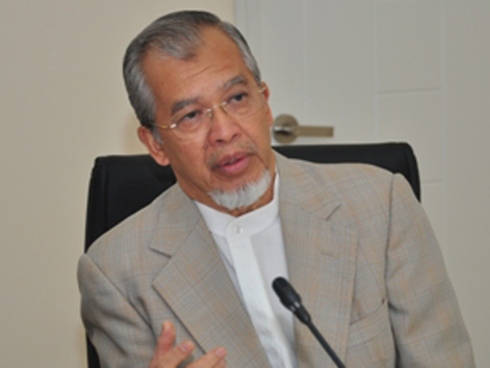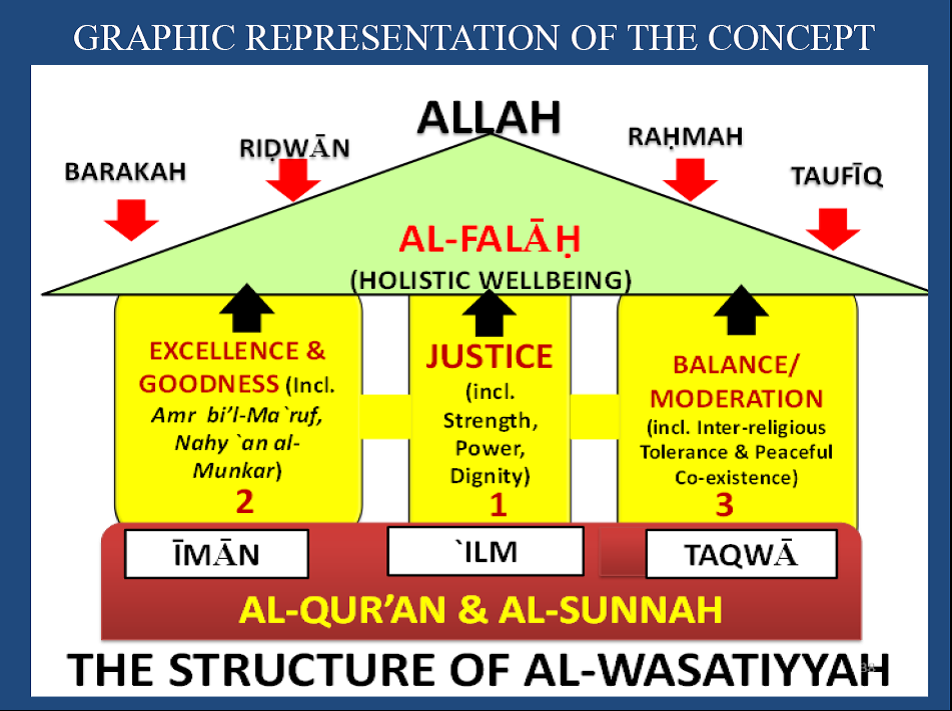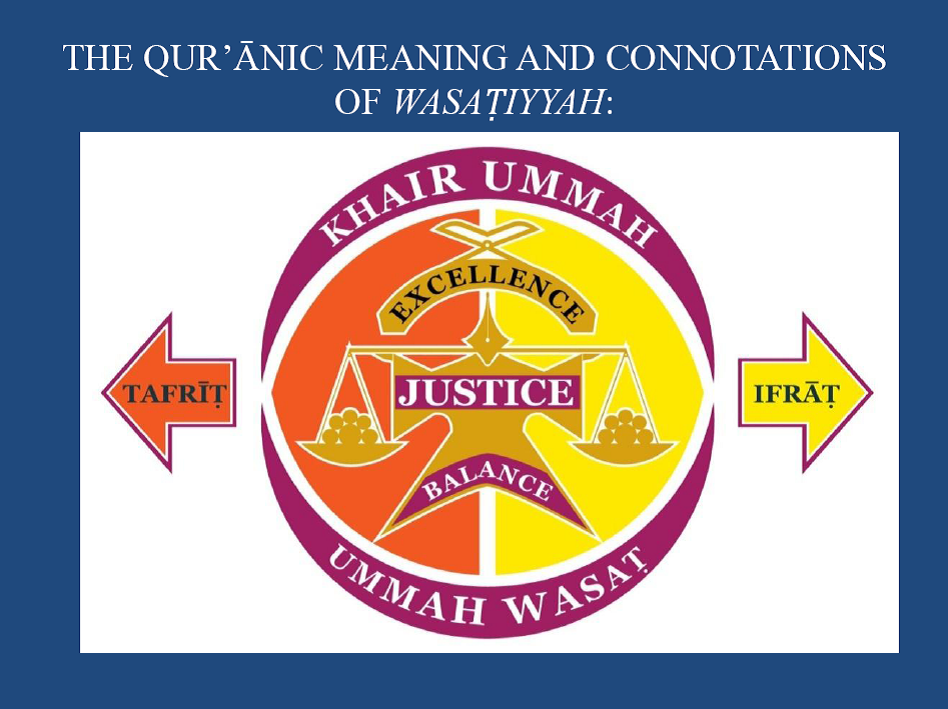Note: I would like to thank bro. Mohammad Hafiz Kusairi for his editing assistance.
Muhammad Haniff Hassan, Wasatiyyah as Explained by Prof. Muhammad Kamal Hassan: Justice, Excellence and Balance, (Forthcoming)
Synopsis
The post-9/11 era has catapulted the issue of wasatiyyah or moderation in Islam, among others, as an important research subject with two key objectives: (1) to correct the image of Islam that has been tarnished by extremism, and (2) to overcome the spread of extremism among the Muslims of the world. Prof. Kamal Hassan’s research calls to be revisited in this regard as it offers a valuable conceptualization on the meaning of wasatiyyah, especially as presented in his address at the Second International Conference on Terrorist Rehabilitation and Community Resilience in Singapore (26-27 March, 2013). He speaks of justice, excellence, goodness and balance as well as other Islamic values as attributes of wasatiyyah, which is commonly, translated rather simplistically as “moderation.”
Introduction
Many measures have been taken in various countries for the study and promotion of moderate Islam or wasatiyyah. It is instructive to review some selected noteworthy contributions made in this regard.
A book entitled Moderation in Islam in the Context of Muslim Community in Singapore was published in 2004 by the Singapore Islamic Scholars and Religious Teachers Association for the purpose of clarifying the meaning of moderation in Islam and guiding the Muslim community towards it as a result of significant events such as the 9/11 attacks, the arrest of JI elements in Singapore and the consequent non-Muslim reactions to both incidents.
Al-Qaradhawi Centre for Islamic Moderation and Renewal was established in Qatar in 2008 under the Qatar Faculty of Islamic Studies with the mission of dedicating itself to research and the promotion of moderation and the renewal of Islamic spirit and intellectualism for the purpose of combating extremism and promoting inter-faith / culture dialogue. The International Centre for Moderation of Kuwait, a government linked institution under the Ministry of Islamic Endowments and Affairs, was established, also for the purpose of research and training for the promotion of moderation and combating extremism.
The Moderation Assembly for Thought and Culture was established under the patronage of the King of Jordan and the Royal Academy of Jordan as a result of a conference held in 2004 and 2006.
In Malaysia, the Wasatiyyah Institute was established in 2005 and the Global Movement of Moderates was introduced in 2010 by its Prime Minister, Mohamad Najib Abdul Razak for the purpose of promoting moderation at local and international level respectively.
In addition to the idea of moderation, these initiatives themselves have become subject of interest and attention of those who are interested in the study.
One of the important questions often asked in the study is; What does moderation / wasatiyyah really mean?
Like many ideas and concepts, the answer to the question is not monolithic even among Muslim scholars. However, this should not be the reason for one to not explore its meaning in order to provide a coherent understanding that would be useful in guiding the society at large.
 Prof. Kamal Hassan’s Research on Moderation
Prof. Kamal Hassan’s Research on Moderation
Prof. Kamal Hassan’s research on the meaning of moderation is very valuable as it seeks to present a complete conceptualization of the meaning of moderation.
Prof. Hassan is an eminent intellectual in Islamic Studies in Malaysia, specialising in Contemporary Islamic Thought, particularly pertaining to the Southeast Asia region. He was the rector of the International Islamic University of Malaysia (IIUM) from 1999 to 2006.
In 2013, he presented his idea of moderation/ wasatiyyah at the Second International Conference on Terrorist Rehabilitation and Community Resilience in Singapore (26-27 March, 2013).
Prof. Hassan explains the concept of moderation using a graphic representation (see Figure 2) which is profound, yet clear to understand, unlike the usually heavy and convoluted academic works on the subject.
[Figure 2: Prof. Hassan’s Graphic Representation of the Concept of Wasatiyyah. Image Source: Prof Hassan’s slide presentation during the conference]
First and foremost according to Prof. Hassan, moderation as an Islamic concept must be grounded on Islam’s two primary sources; the Quran and the Sunnah (the Prophet’s tradition).
Based on these two primary sources, Prof. Hassan premised the concept of wasatiyyah on three key values of Islam; 1) iman (belief), 2) `ilm (knowledge) and 3) taqwa (compliance to divine guidance).
Prof. Hassan does not elaborate much on these three values. However, it could be safely deduced that, by iman, he refers to primarily belief in Allah as the only God (monotheism) and Muhammad is His final Messenger. This a standard belief held by every Muslim and there is no reason to believe that Prof. Hassan is different in this regard.
It’s also not difficult to understand the reason why he positions knowledge as the foundation for wasatiyyah. The importance of knowledge in Islam and, thus, its position as one of the key foundations for such an important concept in Islam – wasatiyyah – can be easily deduced from the fact that it was mentioned together with the issue of belief in Allah in the first revelation to Muhammad (see 96:1-5). Furthermore, knowledge presupposes everything in Islam. One can never believe in the true God without knowledge; what more to uphold the concept of wasatiyyah.
As of taqwa, its importance and centrality in Islam is also an undisputed issue among scholars. Thus, it is understandable if there isn’t elaboration from Prof Hassan too.
What is more important, from Prof. Hassan’s illustration, is his conception that wasatiyyah is not the only concept from which everything in Islam is built upon, despite its importance and centrality and this has important implications;
- to be moderate or to practice wasatiyyah is important but it must not be at the expense of the more important pillars of Islam,
- a Muslim’s understanding and practice of religion must be shaped by the right understanding of wasatiyyah but that understanding itself is not free from any intellectual and conceptual bindings,
- wasatiyyah or moderation cannot be pursued at all costs or interpreted without binding parameters.
Based on this, it should be deduced that the meaning of the word wasatiyyah itself must be based primarily on what these two sources say about moderation and being moderate and not just by mere philosophical thinking or the perceptions of Muslim laymen.
Here, the key reference point from the Quran is the verse, “And thus have We willed you to be a community of the middle way [ummatan wasatan], so that [with your lives] you might bear witness to the truth before all mankind, and that the Apostle might bear witness to it before you…..” (The Quran, 2:143)
The key word that becomes the reference for all scholars on this issue is the Quranic expression ummatan wasatan from which the term wasatiyyah emerged. Both, the expression and the term, were generally translated as a moderate nation and moderation respectively.
However, Prof Hassan has reservations about the close association between wasatiyyah and moderation. Similarly, he was also not inclined to the interpretation of wasatiyyah as merely wholesale manifestations of non-violence or non-radical or non-militant as often used by political leaders in the West as well as in Muslim countries. To him, wasatiyyah is more than just moderation, non-violence, non-radical and non-militant.
Prof. Hassan’s is of the view that, based on his review of the Quran, the Sunnah which speaks of the same topic and the works of Muslim scholars, the meaning of wasatiyyah must encompass three key attributes or pillars that make up this very wasatiyyah building. The three attributes are 1) justice, 2) excellence and 3) balance / moderation.
This attribute of justice is based on a Sunnah that was reported by Ahmad on the authority of Abu Sa`id Al-Khudari that the Prophet interpreted the word wasat in 2:143 to mean justice (al-`adl). Although justice connotes “balance”, “equilibirium” or “moderation” that is similar to the third attribute, it appears, according to Prof. Hassan, to mean more than that and thus deserves to be a separate attribute. It requires an objective mind that is not swayed by emotions, biases or prejudice that would favour any of the disputing sides in making judgments, decisions or solving disputes. This is supported by the meaning derived from the word found in another verse of the Quran that has the same root with wasat (2:143), “Said one of them (awsat-u-hum): ‘Did I not say to you, Why not glorify (Allah)?’” The word awsat in the verse, according to Prof Hassan, has been interpreted by many commentators of the Quran to mean “the most just [a`dal] amongst them”.
The basis for incorporating excellence into the meaning of wasatiyyah is due its usage in Arabic language and a Sunnah. Prof. Hassan pointed to the fact that Arabs understand the word wasat (from which wasatiyyah is derived from) to mean the best or excellence too. This can be understood from the term Awsat Al-`Arab to describe the Quraisy tribe from which the Prophet belongs. The term means the best or noblest tribe among Arabs. A similar point can be found also in a Sunnah which reports that the Prophet was the wasat among his people which the scholars interpreted it to mean “the noblest among his people genealogically”.
The relevance of the third attribute (balance / moderation) is not an issue for such meaning has been widely accepted and used by Arabs in the past and till today. In fact, it is the most explicit meaning that one can derive from the word wasat which explains its popularity and prominence. However, its popular and prominent use also masks the other two attributes that are essential and important to the right understanding and practice of wasatiyyah. Prof. Hassan observes that the qualities of justice and goodness / excellence are being neglected, sidelined or forgotten due to the over-emphasis on moderation. Not only that, he also observes certain skewed understandings of moderation that requires correction for they cannot be said to represent wasatiyyah that incorporates the three attributes. The first misunderstanding and that he warned against which is popular among the political elites is wasatiyyah as “justification for indulgence (tasahul), carelessness or an excuse to be negligent in the performance of religious obligations” or in other words, the non-practicing of Islamic obligations for the sake of being “moderate”.
To Prof. Hassan, moderation is not a stand-alone principle or one that needed to be attained at all costs. It is defined by the Quran and Sunnah being the overall underlying basis as illustrated in the graphic. There is no moderation if it there no justice and there is no justice by transgressing the definitive injunctions of the Quran and Sunnah. If not, “moderation could be understood as a license or permission….to be lax in the performance of religious duties”.
Moderation is also not about being in the supposed median of everything to the extent that it justifies being average or mediocre as understood by many ordinary Muslims. Prof. Hassan asserts that Islam enjoins the value of excellence and hard work and makes these central to its teachings. Thus, mediocrity and being contented with an average achievement is against the teaching of Islam and is not moderation. Moderation is the assumption of a middle position in between two forbidden extremes often defined by Muslim scholars as the modes of excessiveness (ifrat) and laxity (tafrit). It is in this regard that moderation is a just, excellent and balanced concept. This a far cry from the common understanding of being in the middle of two goods or assuming a middle ground between a worst condition and an excellent one when excellence should be the national choice of a righteous Muslim. Moderation is striving to uphold all that is good and commanded in Islam and to achieve excellence (ihsan) in everything.
Prof. Hassan highlights that the Quran in 2:143 relates wasatiyyah with “witnessing unto mankind”. The latter implies divine injunction upon Muslim to be the example and standard for human civilisation as a manifestation of being rahmah li al-`alamin (mercy to the universe) as in 21:107 and khayr ummah (the best nation, as in the verse in the succeeding paragraph). Thus, “to fulfil this key “civilisational witnessing” and leadership mission, the Muslim community has to strive for comprehensive excellence in religious and worldly sciences, in the spirit of absolute and uncompromising monotheism (Tauhid), fulfilling the Divine Trust (Amanah), [and] performance of comprehensive worship of Allah (Ibadah)…”.
One important aspect of Prof. Hassan’s conception of wasatiyyah is the twinning of the concept with the concept of khayr ummah as stated in the Quran, “You are indeed the best community that has ever been brought forth for [the good of] mankind: you enjoin the doing of what is right and forbid the doing of what is wrong, and you believe in God. Now if the followers of earlier revelation had attained to [this kind of] faith, it would have been for their own good; [but only few] among them are believers, while most of them are iniquitous.” (The Quran, 3:110)
These are two inseparable sides of being Muslim (see image 2). The khayr ummah concept affirms the excellence attribute of wasatiyyah and, in addition, entails its important role to mankind – to enjoin all that is good/right and prohibit all that is bad/wrong.
[Figure 3: The Quranic meaning and the connotations of Wasatiyyah. Image Source: Prof Hassan’s slide presentation during the conference.]
To Prof. Hassan’s mind, there is no wasatiyyah or “civilisational witnessing” without Muslims playing this role. In fact he warns, “It should be remembered that the Prophet (p.b.u.h) had warned that dire consequence would befall Muslim communities who fail to fulfil or neglect” this obligation.
From the above illustration, Prof. Hassan lists down few tangible manifestations of wasatiyyah;
- Amr bi al-makruf and nahy `an al-munkar (to enjoin all that is good/right and prohibit all that is bad/wrong) as mentioned above,
- Possession of power and strength because justice cannot be realised without them,
- Tolerance and peaceful co-existence with other religions and cultures,
- Dignity as a result of the three attributes of wasatiyyah.
By the above, Muslims attain a holistic well-being (al-falah) which qualifies them for blessing (barakah), pleasure (ridwan), mercy (rahmah) and success (taufiq) from Allah.
Muhammad Haniff Hassan (Ph.D) is a Fellow at S. Rajaratnam School of International Studies, Nanyang Technological University, Singapore.



